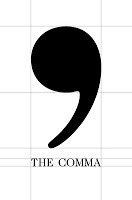Tips for Writers: The Comma
 There aren't a lot of rules in writing fiction, but here'sone that's too often ignored: punctuation matters. It is somewhat shocking tome to see poorly punctuated work by writers who are seeking publication inprofessional journals. Grammar mistakes are one thing; in fiction, many writerstake liberties with grammar. But creative punctuation? I don't think so.
There aren't a lot of rules in writing fiction, but here'sone that's too often ignored: punctuation matters. It is somewhat shocking tome to see poorly punctuated work by writers who are seeking publication inprofessional journals. Grammar mistakes are one thing; in fiction, many writerstake liberties with grammar. But creative punctuation? I don't think so.Periods and question marks are pretty easy, although somewriters aren't sure what to do with them if there's a quotation mark in themix. Most writers stay away from exclamation points, either because they aren'tvery emphatic to begin with or they've heard the maxim that writers arepermitted only three exclamation points in a career and they don't want to usetheirs too soon. Semi-colons are harder, but lots of writers avoid them becausethey either don't like them or know that they don't know how to use them. Fairenough.
The real problem is the comma. I confess that I wasn'tconfident in my comma usage until I started teaching Freshman Composition in acommunity college. I realized that in order to teach kids whose grasp ofgrammar and punctuation was weak, I was going to need to learn it myself. Andwith the help of Diana Hacker's AWriter's Reference, a book I still refer to occasionally, I did just that.
Now, contrary to what I said above, in fiction, especially, one can be somewhatcreative with commas. Although there are rules, and a misplaced comma will drawan editor's attention (not necessarily a good thing), sometimes a writer wantsto slow the reader down or to otherwise alter the rhythm of a sentence. A commais good for that, although a wise writer would be sparing with such usages. But in order to break the comma rules for effect, you first have to know what the rules are.
Here's the tip: find a grammar guide and learn how to usecommas. Your editors will thank you.
Published on October 15, 2011 04:46
No comments have been added yet.



